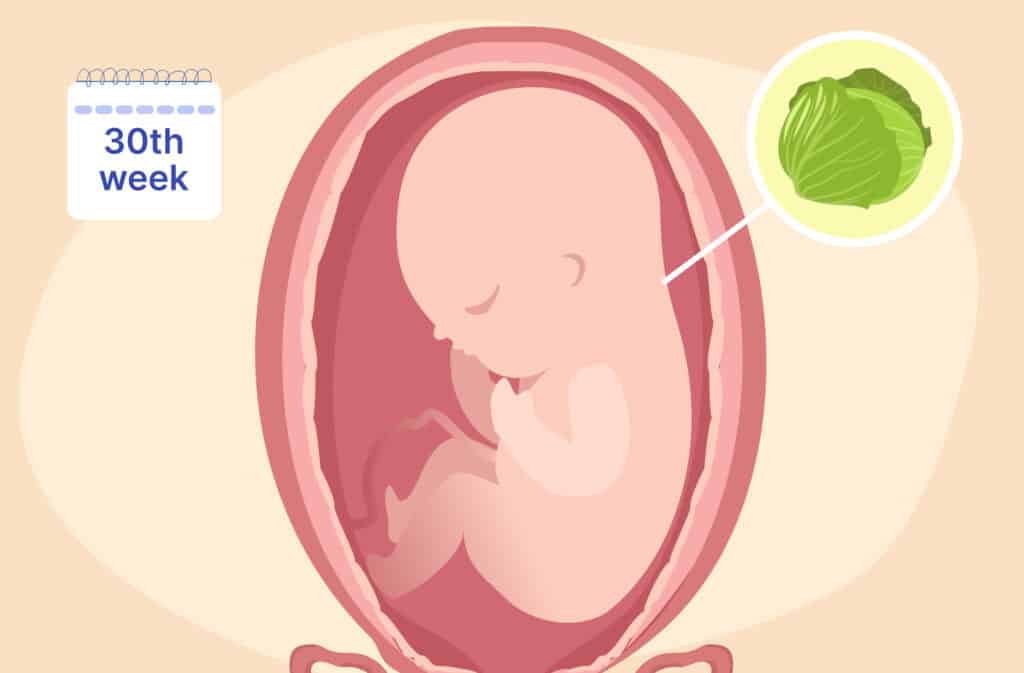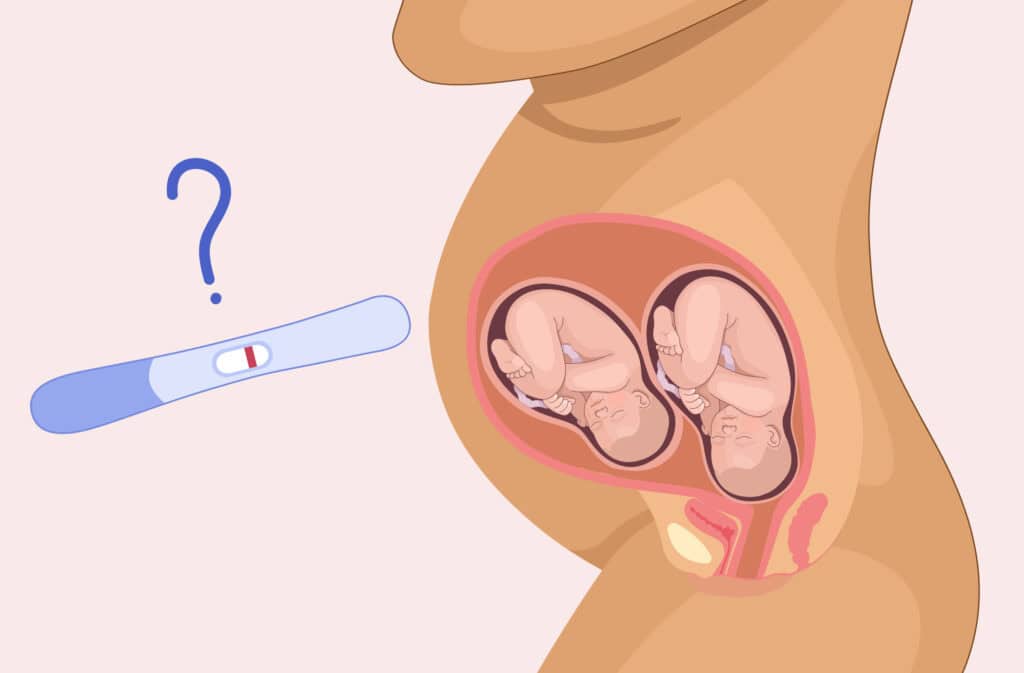Femia > Health Library > Pregnancy > Pregnancy week by week > 30 Weeks pregnant: Baby growth, symptoms, and labor prep
30 Weeks pregnant: Baby growth, symptoms, and labor prep

- Updated Feb 20, 2025
- Published
CRAFTED BY HUMAN
Crafted by human At Femia, we provide accurate and up-to-date information at every stage of your journey, from trying to conceive, pregnancy and postnatal support. All content is created by a real person based on in-depth research and own professional experience. Femia ensures that you will receive expert advice, strict accuracy and a personalized approach from our authors/medical experts. Learn more about our editorial policy.
FACT CHECKED
Fact checked At Femia Health, we maintain the highest standards of editorial excellence in delivering content focused on helping you conceive, guiding you through pregnancy, and supporting you postpartum. Explore our content review principles to learn how we ensure the accuracy and quality of our health and lifestyle tips for every stage of your journey.
At 30 weeks pregnant, your baby is gaining weight, practicing breathing, and responding to sounds. You might experience new or stronger symptoms as your body adapts to your baby’s growth.
You’re now 30 weeks pregnant—welcome to the home stretch! With only 10 weeks left, your baby is growing rapidly, practicing movements, and preparing for life outside the womb. At this stage, you might notice more pronounced symptoms like back pain or Braxton Hicks contractions as your body adjusts. Let’s dive into what’s happening with your baby, your body, and how to prepare for the exciting weeks ahead.
Get personalized insights every step of the way with the Femia mobile app
Pregnancy symptoms at 30 weeks
Here are common symptoms you may experience at 30 weeks:
Belly button changes
As your pregnancy progresses, your belly button may start to protrude due to the expanding uterus, transforming your “innie” into an “outie.” It may also become sensitive to touch or uncomfortable when clothes rub against it. In rare cases, you may develop an incarcerated umbilical hernia, which can cause intense pain if a part of your intestine becomes trapped. If you experience severe pain or notice a lump near your belly button, contact your provider immediately.
Brown discharge
Brown discharge during pregnancy is usually the result of old blood, and it often occurs after activities like sex or a pelvic exam due to the increased sensitivity of your cervix. While this is generally harmless, it may also signal the loss of the mucus plug or “bloody show” as you approach labor. However, if you notice bright red discharge, particularly if you’re under 36 weeks pregnant, or if it has an unpleasant smell, contact your healthcare provider promptly.
Fatigue
It’s common to experience fatigue in the third trimester, even if it’s not as intense as in the first trimester. Carrying extra weight, poor sleep quality, and hormonal changes contribute to this tiredness. Ensure you’re eating a balanced diet, drinking enough water, and incorporating light exercise into your daily routine. If fatigue is accompanied by symptoms like extreme tiredness or sadness, talk to your healthcare provider, as it could indicate anemia or depression.
Swelling
Swelling, especially in the ankles, feet, and legs, is common as your pregnancy progresses. This is due to the pressure from your growing uterus on veins, which causes fluid retention. While this swelling is typically harmless, if you notice sudden or excessive swelling, particularly in your hands, face, or one leg, or if it’s accompanied by severe symptoms, contact your provider, as it could indicate preeclampsia or a blood clot.
Mood swings
Mood swings may intensify in the third trimester due to stress, hormonal changes, and physical discomfort. If your mood swings persist for more than two weeks or become more intense, it may be a sign of pregnancy-related anxiety or depression. Speak to your provider for support, as untreated emotional health issues can impact your well-being and increase the risk of preterm labor.
Shortness of breath
It’s normal to feel short of breath as your pregnancy progresses, due to increased oxygen demands and pressure from your growing uterus on your diaphragm. Although mild breathlessness is common, seek medical attention if you experience sudden, severe shortness of breath, chest pain, or dizziness, as these could indicate a more serious condition.
Weird dreams
Pregnancy often comes with vivid, strange, or even anxiety-inducing dreams. These dreams are linked to hormonal changes, increased blood flow, and the emotional and physical adjustments you’re going through. Many pregnant women report having more intense dreams as they navigate new thoughts and feelings about the pregnancy and upcoming parenthood. While these dreams can feel unsettling, they are typically harmless and often reflectthe subconscious processing of your experiences and concerns.
Anxiety
Anxiety during pregnancy is common due to hormonal fluctuations, physical changes, and the anticipation of labor and parenthood. It’s normal to feel a bit anxious, but persistent, overwhelming feelings of worry or fear might indicate a more serious issue, such as pregnancy-related anxiety or depression. If you find that anxiety is interfering with your daily life, sleep, or well-being, it’s important to talk to your healthcare provider to explore ways to manage these feelings effectively, which may include counseling or therapy.
30 weeks pregnant symptoms not to ignore
- Severe swelling: Particularly in the face or hands, it could indicate preeclampsia.
- Regular, painful contractions: Could be a sign of preterm labor.
- Reduced baby movements: If your baby’s movements decrease, contact your provider immediately.
Braxton Hicks contractions vs true labor
| Aspect | Braxton Hicks Contractions | True Labor |
|---|---|---|
| Frequency | Irregular, not progressively closer together | Regular intervals, getting closer together |
| Intensity | Weak, often described as mild discomfort | Increases in strength over time |
| Duration | Short, usually lasting less than 30 seconds | Longer, lasting 30-70 seconds per contraction |
| Location of Pain | Felt mainly in the front of the abdomen | Starts in the back and radiates to the front |
| Effect of Movement | Stops or decreases with activity or a change in position | Continues regardless of movement or position changes |
| Cervical Changes | Does not cause dilation or thinning of the cervix | Causes the cervix to dilate and thin out (effacement) |
Your body at 30 weeks pregnant
At 30 weeks pregnant, your body is feeling the pressure as your baby continues to grow and take up more space. Your uterus is expanding upward and outward, which may make it harder to breathe deeply and could cause some discomfort in your ribs and diaphragm. You might also notice more frequent trips to the bathroom due to the added pressure on your bladder. Along with the physical changes, you may experience more fatigue as your body works harder to support the growing baby and prepare for labor.
As your due date approaches, it’s normal to feel more frequent or intense Braxton Hicks contractions. These are practice contractions that may become stronger as your body readies itself for childbirth. You might also feel pelvic pain as your baby drops lower, making room for the final stretch of pregnancy. It’s important to listen to your body and rest when needed, staying hydrated, and seeking relief through gentle exercise, stretching, or prenatal massage.
30 weeks pregnant belly
Your belly at 30 weeks reflects your baby’s growth, and you may notice more pronounced kicks and rolls. As your bump grows, you may experience itching or tightness in your skin—moisturizing regularly can help.
30 weeks pregnant in months
You are 7.5 months pregnant, with approximately 10 weeks left until your due date, which is 40 weeks and 0 days.
Baby development at 30 weeks
At 30 weeks, your baby is continuing to grow rapidly and develop the skills needed for life outside the womb.
- Baby’s brain developing: Your baby’s brain is maturing rapidly at this stage. Neurons in the brain are growing at a fast pace, helping the brain to become more complex and capable of controlling body functions. The brain is also forming the ability to regulate breathing and body temperature.
- Baby’s eyes can focus: By now, your baby’s eyes are fully formed, and they can open and close. They can focus on light and even follow objects with their gaze. Your baby may respond to changes in light by moving or reacting.
- Baby’s hair and skin: Your baby’s hair is thickening, and although it may be fine and light in color at birth, it’s starting to grow and become more noticeable. Meanwhile, the skin is maturing and becoming less wrinkled as more fat is stored underneath. This fat helps your baby maintain body heat after birth and is an essential part of development in the third trimester.
At 30 weeks, your baby’s growth is helping them prepare for life outside the womb, and they are continuing to build the necessary physical and neurological foundations for birth and beyond.
30-Week baby size
The 30-week-old baby’s size is about 16 inches long and weighs around 3 pounds, similar to the size of a cabbage. Your baby is continuing to gain fat, which helps regulate their body temperature after birth.
30 weeks pregnant ultrasound
A 30-week ultrasound may be performed if your provider needs to monitor growth, check the baby’s position, or assess amniotic fluid levels. You might see your baby’s facial expressions and movements more clearly during this scan.
30 weeks pregnant ultrasound
A 30-week ultrasound may be performed if your provider needs to monitor growth, check the baby’s position, or assess amniotic fluid levels. You might see your baby’s facial expressions and movements more clearly during this scan.
30-Week preemie
A baby born at 30 weeks has a survival rate of over 95% with appropriate medical intervention. By this week, the baby’s lungs have started producing surfactant, a substance that helps keep their air sacs open, which improves their chances of breathing independently as they grow.
However, they will still require NICU care for issues like feeding through a tube, maintaining a stable body temperature, and possible respiratory support. If a preterm birth is anticipated before 34 weeks, it is common practice to administer antenatal steroids while you are still pregnant. These steroids help the baby’s lungs mature and function more effectively outside the womb. They are typically given between 24 and 34 weeks when delivery during this period is expected or planned.
Babies at this stage typically weigh around 3 pounds (1.4 kilograms) and are at risk for conditions like jaundice or infections, which are closely monitored by healthcare providers.
Tests to expect at 30 weeks pregnant
At this stage, your provider will perform routine tests to monitor your health and your baby’s development:
- Blood pressure check: To screen for hypertension or preeclampsia.
- Fetal heartbeat and movements: Your provider will listen to your baby’s heartbeat and ask about movement patterns.
- Urine test: Screens for protein, which can indicate preeclampsia.
- Fundal height measurement: Monitors the size of your uterus to ensure proper growth.
- Blood tests (if needed): Checks for anemia or other concerns.
These tests help ensure both you and your baby are healthy as you approach delivery. Always discuss any new symptoms or concerns with your provider.
👉Find out more:
31 Weeks pregnant: Baby growth, symptoms, and preparing for birth
32 Weeks pregnant: Baby’s growth, your body, and what to watch for
Get personalized insights every step of the way with the Femia mobile app
Health tips and self-care at 30 weeks pregnant
Mental care
At 30 weeks pregnant, your mental well-being is just as important as your physical health. Pregnancy can bring on a range of emotions, and it’s normal to feel anxious or overwhelmed as you prepare for the birth of your baby. Here are a few tips to maintain your mental health:
- Practice relaxation techniques: Try deep breathing, meditation, or prenatal yoga to help calm your mind and manage stress. These activities can help reduce anxiety and improve your sleep.
- Connect with others: Reach out to friends, family, or a support group for encouragement and to share experiences. Talking about your worries with others can help alleviate stress.
- Seek professional support: If you’re feeling persistently down or struggling with anxiety, talk to your healthcare provider. Therapy or counseling can provide valuable support during this time.
Track baby movements
Monitor your baby’s activity to ensure they’re healthy and active. Recognizing what is normal for your baby’s movements is essential, as every baby is unique. According to updated guidelines from the American College of Obstetricians and Gynecologists (ACOG) in 2021, routine kick counting is no longer recommended as the primary method for fetal monitoring due to limited evidence of its benefits and the potential to increase anxiety. However, if you notice a significant decrease in your baby’s usual activity, it’s important to contact your physician or clinic promptly.
Stay active
Gentle exercise can help you feel better both physically and mentally. Maintaining physical activity can relieve aches and pains, improve circulation, and boost your mood. Here are some tips for staying active safely:
- Low-impact exercise: Swimming, walking, and prenatal yoga are excellent activities during the third trimester. These exercises can reduce swelling, improve flexibility, and strengthen muscles for labor.
- Listen to your body: While it’s important to stay active, make sure you don’t overdo it. If you’re feeling fatigued or in pain, take breaks and rest as needed.
- Pelvic floor exercises: Kegel exercises can help strengthen the muscles that support your bladder, uterus, and rectum. They can also improve your ability to push during labor.
Skincare
Your skin is likely to stretch more as your baby grows, which may lead to discomfort and dryness. Here’s how to care for your skin:
- Moisturize regularly: To help prevent stretch marks and soothe itchy skin, apply a rich moisturizer to your belly, breasts, and thighs. Use products that are safe for pregnancy, and focus on keeping your skin hydrated.
- Stay cool and comfortable: Hormonal changes can cause hot flashes and increased body temperature. Wear loose, breathable clothing, and keep your home cool to prevent overheating.
Diet and hydration
Eating a balanced diet and staying hydrated are essential for both you and your baby at 30 weeks pregnant:
- Eat small, frequent meals: As your baby grows, your stomach may be more compressed, which can make it difficult to eat large meals. Eating smaller meals throughout the day can help you stay nourished and prevent heartburn.
- Stay hydrated: Drink plenty of water to stay hydrated and reduce swelling. Dehydration can lead to cramps, headaches, and fatigue, so aim for 8–10 cups of water daily.
- Include protein and healthy fats: Make sure to get enough protein and healthy fats in your diet to support your baby’s growth. Foods like lean meats, avocados, nuts, and eggs are great options.
By incorporating these health tips and self-care practices into your daily routine, you can feel better physically and mentally as you move through the final weeks of pregnancy.
Questions from the Femia community
What are the best positions for labor?
Upright positions like squatting or kneeling can use gravity to help labor progress. Side-lying positions are also effective, especially if you need to conserve energy. Discuss options with your provider to find what works best for you.
How much weight is average to gain?
Average weight gain by 30 weeks is around 20-25 pounds. However, it varies depending on your pre-pregnancy weight. Your provider will monitor your weight to ensure it’s within a healthy range for your baby’s development.
Why do I feel mild contractions?
These are likely Braxton Hicks contractions, which are irregular and painless. They’re a normal part of pregnancy as your body practices for labor.
What not to do at 30 weeks pregnant?
At 30 weeks pregnant, it's important to avoid lifting heavy objects, as this can strain your back and pelvic muscles. Standing for long periods should also be avoided to prevent increased swelling and discomfort. Overexerting yourself can lead to exhaustion, so it’s essential to listen to your body and take breaks. High-risk activities like contact sports or those that pose a risk of falling should be avoided to protect both you and your baby. Lastly, try to manage stress by focusing on relaxation and self-care to maintain emotional well-being.
The bottom line
At 30 weeks pregnant, your baby is growing rapidly, and your body is preparing for the final stretch of pregnancy. Stay proactive by tracking symptoms, maintaining good posture, and discussing any concerns with your provider.
References
- “30 Weeks Pregnant: Symptoms, Baby Development & Tips.” BabyCenter, www.babycenter.com/pregnancy/week-by-week/30-weeks-pregnant.
- “Week 30 of Pregnancy: Symptoms, Baby Development & More.” What to Expect, www.whattoexpect.com/pregnancy/week-by-week/week-30.aspx.
- “30 Weeks Pregnant: Baby Development, Symptoms & Tips.” NHS, www.nhs.uk/pregnancy/week-by-week/1-to-12/30-weeks/.
- “Pregnancy Week 30: What to Expect.” American Pregnancy Association, www.americanpregnancy.org/healthy-pregnancy/week-by-week/30-weeks-pregnant/.
- Patki, Mugdha, and Manasi Pisal. “Role of Oxidative Stress in Oocyte Aging and Reproductive Outcomes.” Journal of Human Reproductive Sciences, vol. 10, no. 3, 2017, pp. 214–220. PubMed Central, https://pmc.ncbi.nlm.nih.gov/articles/PMC4921282/. Accessed 17 Oct. 2024.
- Smith, Jane, et al. “Updated Guidelines on Fetal Movement Monitoring and Its Implications for Practice.” MCN: The American Journal of Maternal/Child Nursing, vol. 49, no. 6, 2024, pp. 321–326. Lippincott Williams & Wilkins, https://journals.lww.com/mcnjournal/pages/articleviewer.aspx?year=2024&issue=11000&article=00002&type=Fulltext. Accessed 14 Nov. 2024.

Learn why a twin pregnancy might result in a negative test. From testing too early to diluted urine, discover the factors affecting twin pregnancy test results.

What is ureaplasma? Discover the symptoms of Ureaplasma in females, how it is diagnosed, and the treatments. Learn how this infection can impact fertility and well-being.

Can you fly when pregnant? Click for an overview of flight safety during pregnancy, airline policies, and tips to ensure a smooth and safe flight!

